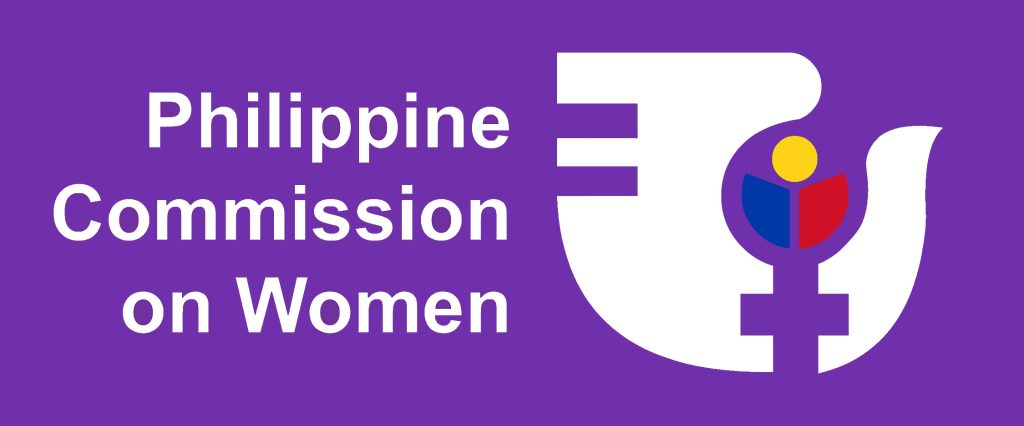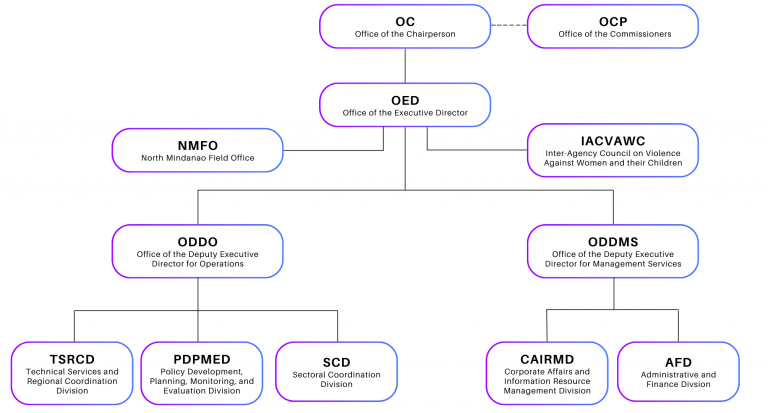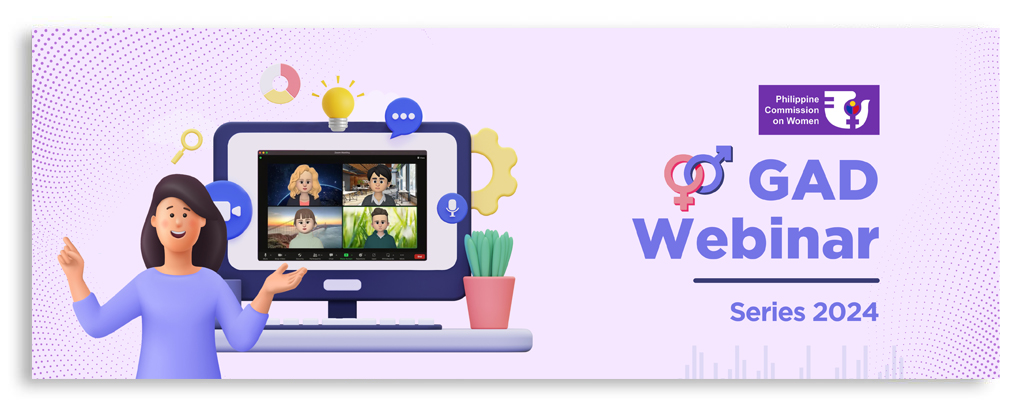The Philippine Commission on Women (PCW) is the a government agency that serves both as the policy-making and coordinating body when it comes to women and gender equality in the Philippines. Its main purpose is to promote gender equality and empower women in the Philippines. As the agency-in-charge, it formulates and implements policies, programs, and projects tailored to the specific needs of women, in an attempt to create a more inclusive society. It tackles gender-based disparities, in an attempt to solve social issues related to inequality and discrimination towards women.
Note: While DSWD may also assist with programs for women and gender equality, PCW focuses specifically on these issues and is the primary agency responsible for them.
Understanding what PCW is and how it works to ensure that the needs of women are considered in government programs helps empower the female citizens to advocate for more gender-responsive policies that benefit all Filipinos, especially the marginalized. Consequently, ignorance of this government initiative could lead to missed opportunities for financial or cash support and other resources, hindering societal efforts to achieve social equity.
What is PCW
PCW stands for the Philippine Commission on Women, an agency designed to showcase and embody the government’s commitment to promoting gender equality and empowering women across the nation. Its primary goal is to make sure that women’s rights are protected and that gender equality is integrated in every aspect of national development.
As an organization, the PCW is designed to address gender-based disparities and advocate for policies that uplift the status of women. This includes working on issues such as economic empowerment, protection from violence, and ensuring equal opportunities in education and employment. Through its efforts, the government aims to create a society where women can fully participate in and get equal treatment and benefit from their social, economic, and political life.
History
The PCW was officially launched and established in 1975 by virtue of the Presidential Decree No. 633 signed into effect by President Ferdinand Marcos. Originally named the National Commission on the Role of Filipino Women (NCRFW), it was created to promote the welfare of women and ensure their integration into the social, economic, and political development of the country. In 2009, it was renamed the Philippine Commission on Women through Republic Act 9710, otherwise known as the Magna Carta of Women. The PCW has since advocated for gender-responsive policies and programs, becoming an agency instrumental in advancing women’s rights and addressing gender-based violence, economic empowerment, and gender equality issues. To date, it remains active in collaborating with government agencies, civil society organizations, and international bodies to implement gender-responsive policies and programs and create a more inclusive society, where women have equal opportunities and protection under the law.
Logo

The PCW logo is a carefully designed emblem that reflects the organization’s core values and mission. It features the type “Philippine Commission on Women” and a dove symbol, along with other symbolic elements, each representing aspects of women’s roles in society, peace, equality, and development. The use of purple, a color globally recognized for symbolizing justice and dignity for women, adds emphasis and distinction to the logo.
- Philippine Flag: A stylized version is placed at the center of the dove, signifying PCW’s role as the national machinery for women in the Philippine Government.
- Dove Symbol: The dove, facing right, signifies peace and development, with its tail forming an “equal” sign to represent equality. The woman’s symbol inside the dove underscores women’s roles in promoting peace, equality, and development.
- Type: The text “Philippine Commission on Women” is positioned on the left side of the dove symbol, written in Arial Bold for clarity and prominence.
The overall design elements are intended to communicate the PCW’s commitment to advancing women’s rights and gender equality in the Philippines.
Mission
“The PCW is a policymaking, advisory, and coordinating body that leads in the development of gender-responsive policies, conduct of advocacy, provision of appropriate and strategic technical assistance, and monitoring and evaluation of plans and programs on gender mainstreaming towards a more gender-responsive government bureaucracy and institutions.”
Vision
“PCW is a nationally and globally recognized premier policy-making and oversight agency on gender equality and women empowerment effectively collaborating with stakeholders in building a gender-responsive Philippines where women and girls are recognized, valued, and empowered as agents of positive change.”
Core Values
The Commission upholds the following core values:
- Passion for Excellence: PCW fosters a culture of dedication, aiming for high productivity and inspired leadership, ensuring that all employees strive to achieve the organization’s vision and mission through exceptional performance.
- Professionalism: PCW staff are skilled, exercise good judgment, and adhere to ethical and technical standards, ensuring they act courteously and conscientiously as public servants.
- Integrity: PCW emphasizes honesty and ethical conduct in public service, ensuring the proper use of powers, resources, and funds for their intended purposes.
- Teamwork: PCW promotes collaboration and respect among employees, working together effectively and efficiently to fulfill the agency’s mandates.
- Accountability: PCW instills a culture where employees take responsibility for their actions, reinforcing transparency and good governance.
Quality Policy
The PCW is dedicated to promoting gender equality and empowering women by protecting their socio-cultural, economic, civil, and political rights. As a policy-making and coordinating body, PCW focuses on providing the following:
1. Development, advocacy, and monitoring of relevant and responsive policies.
2. Strategic and effective technical assistance.
PCW employees work to enhance their expertise and deliver services through efficient and innovative methods to meet client and stakeholder needs, while adhering to legal and regulatory standards.
Mandates and Functions
The Philippine Commission on Women (PCW) is responsible for promoting gender responsiveness in national development plans, coordinating the National Plan for Women, and monitoring its implementation. The organization advocates for women’s economic, social, and political empowerment while ensuring that cultural gains for women are preserved in modernization. PCW also provides technical assistance for gender mainstreaming and works to strengthen gender mechanisms across various government agencies.
Major Functions
- Ensures gender responsiveness in national development plans and oversees the National Plan for Women, ensuring its implementation at all levels.
- Promotes women’s empowerment and supports the establishment of gender mainstreaming mechanisms.
- Safeguards cultural and traditional gains for Filipino women while embracing modernization.
Specific Roles
- Coordinates the preparation and updating of Philippine development plans for women.
- Serves as a clearing house and database for women’s information.
- Conducts programs to raise gender consciousness.
- Reviews policies and legislation to integrate women’s concerns.
- Provides technical support for gender and development (GAD) mainstreaming.
- Monitors the implementation of laws, policies, and international conventions on women.
- Implements pilot projects to inform policy and program development for women’s services.
Organizational Structure

The organizational structure of the PCW is designed to effectively implement its mandates and functions in promoting gender equality and women’s empowerment. Each division and office within the PCW plays a specific role in ensuring the agency operates efficiently and fulfills its mission.
- Office of the Chairperson (OC): Sets the policy direction and collaborates with government institutions to fulfill the PCW’s mandate.
- Office of the Executive Director (OED): Oversees daily operations, manages resources, and guides the strategic and corporate planning of the PCW.
- Policy Development, Planning, Monitoring, and Evaluation Division (PDPMED): Creates GAD policies, coordinates with Congress for gender-responsive laws, and monitors the implementation of relevant laws and international commitments.
- Sectoral Coordination Division (SCD): Provides technical assistance to sectoral agencies and ensures the gender-responsiveness of their policies and programs.
- Technical Services and Regional Coordination Division (TSRCD): Offers GAD-related technical assistance to regional agencies and local government units (LGUs) and conducts capacity development sessions.
- Corporate Affairs and Information Resource Management Division (CAIRMD): Manages ICT infrastructure and the PCW’s Women’s Information Center, and leads communication strategies for the agency.
- Administrative and Finance Division (AFD): Handles daily administrative and financial services, including human resources, budgeting, procurement, and general services.
Benefits
The establishment of the PCW has brought significant benefits to the country by promoting gender equality and empowering women in various sectors. PCW’s efforts have helped to address gender disparities and enhance the well-being of Filipino women, ultimately contributing to the nation’s overall development.
1. Promotion of Gender Equality
PCW has been instrumental in advocating for equal rights and opportunities for women, ensuring that gender considerations are integrated into national policies and development plans.
2. Empowerment of Women
Through various programs and initiatives, PCW has empowered women by enhancing their social, finncial, and political participation, leading to improved quality of life and greater representation in decision-making processes.
3. Advocacy for Women’s Rights
PCW always strives to protect and advance women’s rights in the Philippines, working to eliminate gender-based violence, discrimination, and other forms of inequality.
4. Capacity Building
The commission provides training and technical assistance to government agencies and local government units, enabling them to implement gender-responsive programs and policies effectively.
5. Monitoring and Evaluation
PCW monitors and assesses the implementation of laws and policies related to gender and development, ensuring that commitments to women’s empowerment are upheld and that progress is continuously made.
6. Education for Women
PCW strives to educate women, enabling them to participate in the labor force to sustain herself and the needs of her family. It is a facilitating factor towards women’s economic empowerment. After all, educated women not only lead a better quality life for their children, but also build smaller families, with a lower rate of children dying in infancy; and with their surviving children also receiving better access to education.
Coverage
The PCW also covers a wide range of beneficiaries through its various programs aimed at promoting gender equality and women’s empowerment. These beneficiaries include women and marginalized groups across different sectors, as well as the following:
- Filipino Women: PCW’s programs primarily benefit Filipino women by promoting their socio-economic, cultural, and political rights, ensuring they have equal opportunities in all areas of life.
- Marginalized Groups: The commission also focuses on marginalized groups, including women in rural areas, indigenous communities, and the urban poor, helping to address the unique challenges they face.
- Government Agencies: PCW works closely with government agencies, providing them with the necessary tools and training to implement gender-responsive policies and programs effectively.
- Local Government Units (LGUs): Local government units benefit from PCW’s technical assistance and capacity-building programs, which help them mainstream gender considerations into local development plans.
- Civil Society Organizations (CSOs): PCW collaborates with civil society organizations to strengthen advocacy efforts for women’s rights and to ensure that grassroots communities are included in the national gender and development agenda.
Programs and Services
The PCW leads several initiatives to enhance the capacities of government agencies, local government units, and other stakeholders in integrating gender and development (GAD) principles into their policies and practices so their actions align with the Magna Carta of Women (MCW).
Here is a list of key PCW programs:
1. GADtimpala

The GADtimpala program recognizes outstanding efforts in gender and development by government units and organizations. It includes initiatives like the Gender Justice Awards and the Search for Outstanding VAW-Responsive Local Government Units, which highlight the judiciary’s role in addressing violence against women (VAW) and commend local governments for their gender-sensitive VAW initiatives.
2. GAD Webinars

GAD Webinars are part of the PCW’s National GAD Resource Program, offering accessible online seminars on gender mainstreaming. These webinars provide vital training for government agencies and the general public on gender analysis, gender-sensitive planning, and the implementation of gender-responsive policies.
3. Gender and Development Local Learning Hub
This program, under the Local GAD Resource Program, certifies local government units (LGUs) as GAD Local Learning Hubs. It promotes the sharing and replication of successful gender mainstreaming practices, helping LGUs enhance their initiatives to eliminate gender discrimination and uphold women’s rights.
4. GREAT Women Project 2
Funded by the Government of Canada, this project aims to economically empower women micro-entrepreneurs by improving the competitiveness and sustainability of their businesses. The PCW, in partnership with various government agencies and private sector partners, implements this initiative to create a supportive environment for women’s economic participation.
5. National Gender and Development Resource Program
Launched in 2013, the NGRP serves as PCW’s blueprint for providing technical assistance on gender and development. It offers capacity-building support to government agencies, develops GAD tools and resources, and coordinates a pool of GAD experts to ensure effective gender mainstreaming across the public sector.
6. National GAD Resource Pool Batch 9
This initiative invites GAD advocates and experts to join the National GAD Resource Pool, a community dedicated to promoting gender equality. Members of this pool are trained and certified to deliver GAD-related technical assistance, ensuring that government agencies and other stakeholders receive high-quality guidance on gender issues.
7. Certification of GAD Training Programs
To standardize and enhance the quality of GAD training programs across the Philippines, the PCW offers a certification system. This program ensures that training institutions adhere to established standards, thereby strengthening the capacity of various sectors to implement gender-sensitive policies and practices.
Through these programs, the PCW continues to lead the way in creating a more gender-responsive and equitable society.
Video: PCW Through The Years
For nearly five decades, the PCW has been at the forefront of advancing gender equality and empowering women across the nation. Since it was established in 1975, watch this video and learn more about how PCW has worked to influence policies, promote social legislation, and support gender-responsive programs, especially for the most vulnerable women, undeterred by challenges like the COVID-19 pandemic.
Summary
The PCW is all about advancing gender equality and empowering women across the country through its diverse programs and initiatives. By understanding its functions and taking advantage of its resources, both individuals and organizations can contribute to creating a more inclusive and equitable society for men and women alike.
Contact Information
To learn more about how you can get involved or benefit from PCW’s programs, visit their official website or follow their social media channels for updates.
Philippine Commission on Women
Main Office Address: 1145 J. P. Laurel Street Malacañang Palace Complex, San Miguel, Manila 1005
PCW Trunklines: (+632) 8735-1654, 8735-4767 & 8736-7712
Fax number: (+632) 8736-4449
Email Address: records@pcw.gov.ph
Official website: https://pcw.gov.ph/
Social Media Pages:
Facebook: https://web.facebook.com/PCWgovph
Instagram: https://www.instagram.com/pcwgovph?igsh=MWh2YmdidzBtMWE2Yw==
Youtube: https://youtube.com/@pcwgovph?si=MITXZMiR1itEGI5i
X: https://x.com/PCWgovph?t=RI5WQobFdfP-yE8ywgYcjw&s=09
For Violence Against Women (VAW) concerns only:
Inter-Agency Council on Violence Against Women and Their Children Secretariat
Email Address: iacvawc@pcw.gov.ph
Contact Numbers: 8735-1654 loc.123, 124, 0917-867-1907, 0945-455-8121
Note: Non-VAW concerns should be sent to the contact information above.